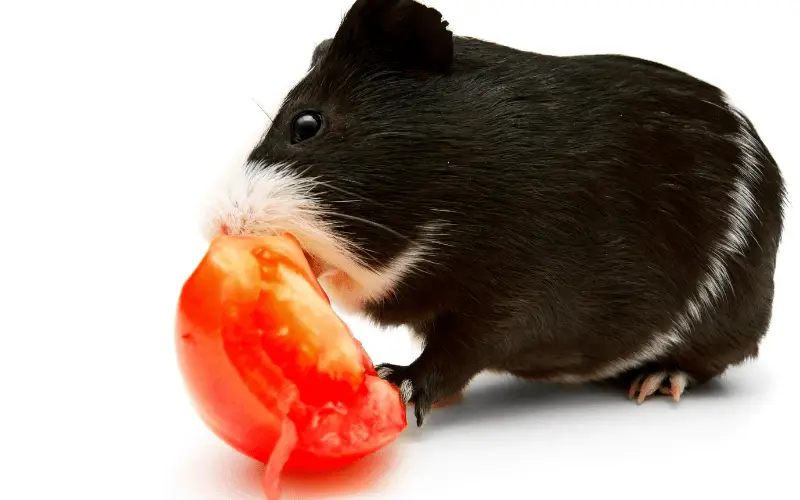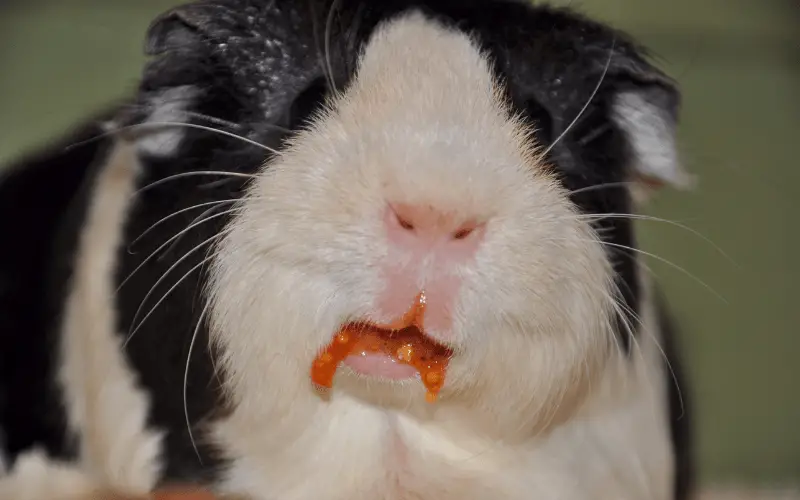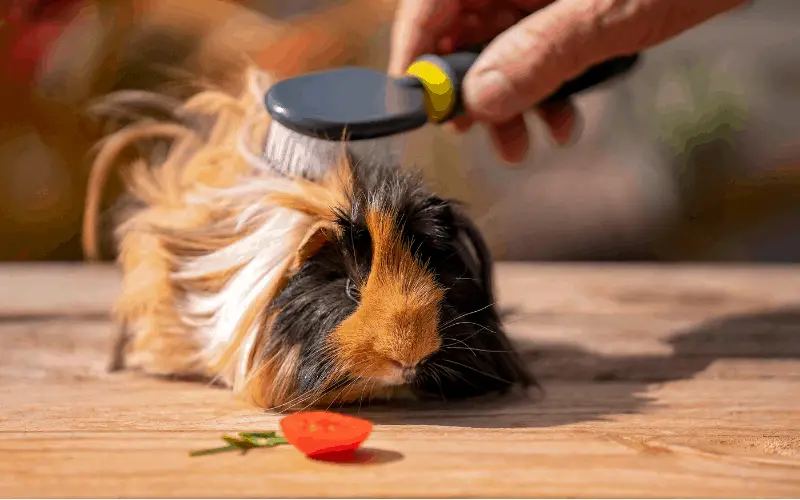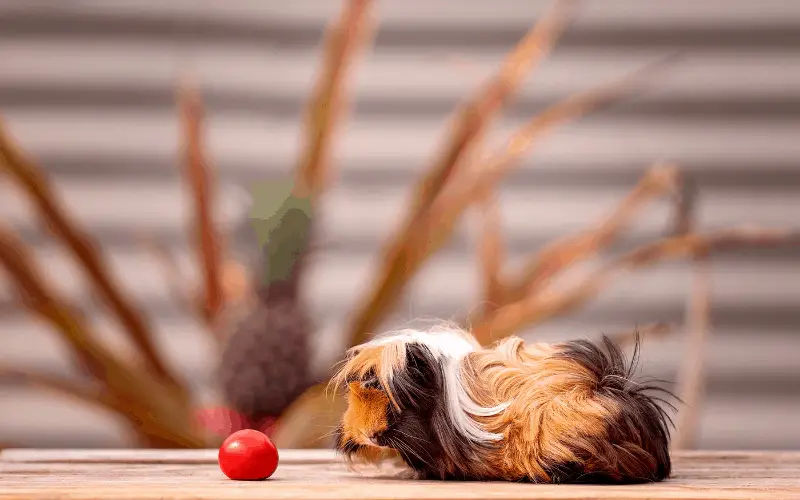You must have read many times, at least from here, that guinea pigs are picky eaters. This knowledge can be useful and as well as daunting. Why, because it leaves you always wondering what best to give your guinea pig. It pushes you to be more particular about your pet’s diet.
However, can guinea pigs eat tomatoes? This is a question that may have come across your mind, and the answer is yes, guinea pigs can eat tomatoes. But this comes with a caveat.
You have to remove the leaves and the vines because they harm the guinea pig. Once these threats (leaves and vines) are gotten rid of, your guinea pigs can enjoy tomatoes.
Now, let’s get down to more details on guinea pigs’ relationship with tomatoes.
What Are Tomatoes?
Tomatoes are edible berries, which initially were only found in Central and South America. However, globalization has made the plant to reach and be planted in various parts of the world. It is one of the ingredients used to make stews.
Tomatoes are excellent sources of umami flavor and lycopene, an antioxidant that combat cancer and heart disease. It is a good source of nutrients for man and animals.
Can Guinea Pigs Eat Tomato?

As stated earlier, guinea pigs can eat tomatoes but right after the leaves and vines are removed. This isn’t the only caveat to guinea pigs eating tomato, there is more.
Another caveat is that you should feed the guinea pig with the tomatoes in moderation. When you provide your guinea pig with too many tomatoes, you harm them. This is because the acidic nature of tomatoes can cause your guinea pig to develop mouth sores. The seeds of the tomatoes are not harmful to them.
Every species or varieties of tomatoes is safe for the guinea pig to eat, but do not give your pet unripe tomatoes. The tomatoes must be ripe before you give your guinea pigs.
Again, it is not every part of the tomatoes that you should provide your guinea pig. You can only feed the guinea pig with the seeds, skin, and tomatoes’ flesh.
Other parts of tomatoes, such as the stem and leaves, contain a chemical known as tomatine. Tomatine in tomatoes is not dangerous to man because the quantity is too small to harm humans.
But for the guinea pig, it can be a disaster. It can cause serious health challenges to your pet. So, while you need to feed your guinea pig with such nutritious food, you should not hurt your pet while trying to feeding it.
Are Tomatoes Dangerous to Guinea Pigs?
Tomatoes are not dangerous for guinea pigs. Your pets can eat them. Tomatoes have some vital nutrients that the guinea pigs need. Some of such nutrients are vitamin A and vitamin C.
Before serving the guinea pigs with tomatoes, wash them properly to get rid of pesticides or mold. Cut them into smaller pieces and then give them to the guinea pigs bit by bit.
Even though tomatoes are nutritious for guinea pigs, you should not serve it in excess because they have sugar content that is too high for guinea pigs. Excess sugar will make the guinea pig more prone to obesity.
Do Guinea Pigs Enjoy Eating Tomatoes?
Can guinea pigs eat tomatoes? Yes. But do they enjoy eating tomatoes? The answer is yes. Many guinea pigs like eating tomatoes.
They are one food guinea pigs take seriously. You will most likely find your pet scurrying in one corner to feed on the tomatoes to avoid interruption.
Cut the tomatoes into pieces so the guinea pig can nibble them. It would help if you tried removing the tomatoes’ water as it can cause stomach upset for your tiny friend.
After the guinea pig has eaten, remove any leftover from the cage so that they do not breed flies and bacteria. The favorite type of tomatoes for the guinea pig is the cherry tomatoes.
Do Tomatoes Elicit Allergic Reactions from Guinea Pigs?

There has not been a record of guinea pigs reacting negatively to tomatoes, but that does not mean it is entirely impossible. Like humans who could react to certain foods, certain guinea pigs could be allergic to tomatoes.
When adding tomatoes to the diet of the guinea pig, you must watch it closely. If signs of allergy show up, then you must withdraw the tomatoes immediately.
First, start with giving your pets a small number of tomatoes. When you do that, place them under serious observation. If there are signs of allergies or discomfort, do not give them the tomatoes to eat again.
Read Also: Can Guinea Pig Eat Willow Tree Leaves?
What Types of Tomatoes Can You Feed Your Guinea Pigs With?
Can guinea pigs eat tomatoes? Yes. Can they eat just about any tomato variety? Yes! It is good to give guinea pigs all kinds of tomatoes. However, these should be given to them in little quantities occasionally.
It is also vital for you to remember that the stalks and leaves are not suitable for your pets because they are poisonous.
There are different kinds of tomatoes. There is the beef, the cherry, the plum, etc. You can give your guinea pig any of these to eat but ensure that they are ripe without being too soft.
If you are giving the guinea pigs cherry tomatoes, you can let them have it whole, but for other tomato varieties larger than the cherry; you have to cut them into pieces.
Cutting the tomatoes into smaller pieces will help the guinea pig eat them slowly and prevent the tomatoes from disrupting their digestion.
Many guinea pig owners have observed that their pets usually take the cherry tomatoes from their feeding bowl to a secluded corner of their cage to eat alone. This is because the tomatoes are favorites for guinea pigs, and they hate to share such a bundle of sweetness.
While some fruits whose seeds are dangerous for guinea pigs to eat, the seeds of tomatoes are safe. Remember, you should remove the stalk, leaves, and the vine from the tomatoes before giving it to the guinea pig.
After one hour of serving the guinea pig with tomatoes, remove every half-eaten and uneaten tomato from the cage. Tomatoes are soft and attract flies that spread germs, which is risky for your guinea pigs. If they ingest any food contaminated by germs, they will fall ill.
Nutritional Content of Tomatoes
Tomato is a decadent fruit in the world in terms of its nutrients. Ninety-five percent of the tomatoes consist of water, and the remaining 5 percent consists of fiber and carbohydrates.
A 100-gram tomato has the following nutrients.
- Water: 95 percent
- 9 grams of carbohydrate
- 2 grams of fiber content
- 9 grams of protein
- 2 grams of fat
- 6 grams of sugar
Fiber
Fibers comprise 1% of tomatoes. That is 1.2 grams for a medium-sized tomato. The fibers in tomatoes are cellulose, hemicelluloses, and lignin, and they are insoluble.
Carbohydrates
Carbohydrates make up 4% of tomatoes. This is 4 grams for a medium-sized tomato. These carbohydrates are mostly simple sugars like fructose and glucose, and they make up 70% of tomatoes’ carbohydrate content.
Minerals and Vitamins
- Vitamin K: This is the vitamin that aids blood clotting and enhances bone health. Vitamin is also known as phylloquinone.
- Vitamin C: This is an important antioxidant. One small-sized tomato can provide 28% of the daily recommended intake of vitamin c.
- Vitamin B9 (Folic acid): This is the vitamin responsible for the proper development of the DNA. It is vital for pregnant guinea pigs. It aids cell function and tissue growth.
- Potassium: Another essential mineral found in tomatoes is Potassium. Potassium is instrumental in the control of blood pressure. It also helps in preventing heart diseases.
Read Also: Is Chard Good for Guinea Pigs?
Why Feed Your Guinea Pigs with Tomatoes?

Are there reasons to feed guinea pigs with tomatoes? Is there anything they stand to gain by eating tomatoes? Yes. Tomatoes are quite beneficial to the guinea pigs, and here is why.
Guinea pigs, just like humans, cannot make all the vitamins they need. Not just that. Guinea pigs cannot store some vitamins either. This means that once the body takes the one it is using, it discards the rest. Hence, the guinea pig needs a constant supply of vitamins.
One of those vitamins they need is vitamin C. It is an essential nutrient for the guinea pigs, and the pets need it for their immune system’s healthy functioning. Suppose there’s a deficiency of ascorbic vitamin C in the diet if your guinea pig, will develop scurvy.
Scurvy is terrible news for guinea pigs. It causes weakness, rough hair coat, loss of appetite, stiffened limbs and joints, limping, eye and nose discharge.
To avoid these conditions, the guinea pigs’ diet must have enough vitamins C. What way could have been better to give them this vitamin than feeding them with the vitamin C-rich tomatoes?
Furthermore, tomatoes have other minerals and vitamins like Vitamin K, Vitamin B, Vitamin B-6, iron, and a host of other minerals. These minerals and vitamins are vital and make the tomato a great plus in the guinea pigs’ diet.
The nutrients also help to improve the teeth of the guinea pig. They also ensure that the organs of the guinea pig are working correctly.
Tomatoes have some nutritional fiber, and fiber should be a primary constituent of the guinea pig’s diet. Why? Because the digestive system of the guinea pigs is sensitive and does not allow just about anything. Too many changes in the diet of the guinea pig will cause illness for the guinea pig.
The fiber in the diet helps to strengthen the digestive system. They also help in loosening up the bowels to make for easy movement of digested food.
Tomatoes are such a right choice for guinea pigs. This is because of their low calcium content. For guinea pigs, a minute calcium amount is okay. If you feed your guinea pig too much, it can lead to the formation of bladder stones.
Just a little amount of calcium is okay for forming strong and healthy bones. So, with tomatoes, there’s no risk of the guinea pig taking in a lot of calcium.
Can Guinea Pigs Eat Unripe Tomatoes?
It is not healthy for guinea pigs to eat unripe tomatoes. These unripe tomatoes have some chemicals that are not safe for your guinea pigs. So, it would be best for you to feed the guinea pigs just with ripe tomatoes only.
The toxic substances that are in the leaves and stems of tomatoes are also abundant in unripe tomatoes. These toxins do not go away completely when the tomatoes ripen, but they reduce drastically and do not cause much harm.
When your guinea pigs eat unripe tomatoes, they will have some of these symptoms:
- Intestinal pain
- Dilating pupils
- Vomiting
- Improper motor coordination
- Excess salivation
- Itching
- Drowsiness
How Much Tomatoes Can Guinea Pigs Eat?
You can feed your guinea pigs with tomatoes, but you have to supervise them. This supervision is, so they do not eat much of the tomatoes at once. You have to monitor the number of tomatoes they eat because too many tomatoes can make your guinea pig sick.
Too many tomatoes will cause the guinea pig to develop cardiovascular problems. It will also damage the guinea pig’s nervous system. The chemicals that are used to plant the tomatoes are what cause these complications for your guinea pig.
Read Also: Can Loneliness Kill Guinea Pigs?
What Else Can Guinea Pigs Eat?
If you are looking for more information, walkthroughs and troubleshooting about Guinea Pigs and their diet, here are some additional posts you can check out:
Conclusion
To sum it all up, can guinea pigs eat tomatoes? Absolutely! You can give your guinea pigs tomatoes to eat. So, if you have a garden where you plant tomatoes, you better bring some for your pet to eat. But you have to make sure that the tomatoes are very ripe.
Also, ensure that the guinea pigs are not feeding on the stem or the tomatoes’ leaves. This is because they contain toxins that can make your guinea pigs ill.
It would help if you also remembered to wash the tomatoes before giving them to your pets. You can also give your guinea pig tomato sauce as long as it does not have any addictive.
Lastly, ensure that your pet does not take too many tomatoes even if ripe, as too many tomatoes will harm your guinea pig.
